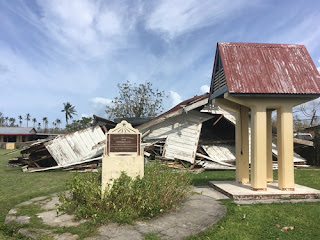 |
| House on Bypass Road which we pass every day |
I heard on the news that due to Tonga strict laws prohibiting shopping on the Sabbath, preparations for Cyclone Gita were hampered. I do not think this is the case. The storm was supposed to hit Sunday, but instead came in force on Monday night, giving the people time for preparations. The storm's fury only lasted about 5 hours, rather than the expected 12-18, thus minimizing damage that could have come.
I read that there was not a single death in this severe storm. There were 30 people seriously injured and 3 were hospitalized. The Lord answered our prayers and minimized injuries to the people.
I believe the Lord blessed this Kingdom of Tonga because of the people's dedication to keep the Sabbath day Holy and their love of God and family.
 |
| Sopu |
I would say 50% of all homes were damaged or destroyed. Many people live in homes constructed in a make-shift manner of poor quality materials. Thus, damage was great on the island.
The day after the hurricane, people could be seen cleaning up their yards and communities. PTH, the local hardware, is full of people buying supplies to repair their homes. The people are industrious, not only fixing their own homes but their neighbors as well.
 |
| Downtown Nuku'alofa |
Roofs are made of corrugated steel. The hurricane winds tore many of these roofs off and threw them about.
There is much corrugated steel wrapped around poles, left in piles, and even high in the trees.
 |
| Flying debris and fallen poles caused electrical wires to go down. |
 |
| Near Sia'atoutai Theological College |
Almost no homes have electricicity, including downtown. Few have emergency generators. So the work of recovery is done in the daytime. We at Liahona do have an emergency generator so our lives have not been altered too much. Most homes also do not have potable water. We at Liahona do have good water and use a filter in each of our homes. We either take that water in bottles with us during the day or drink bottled water purchased at stores. Internet is off and on here at Liahona, nonexistent elsewhere.
 |
| Sister Thomson couldn't resist. She had to climb the tower! |
Water towers toppled with the hurricane winds. The two tanks in Veitongo crashed down, one even the tower twisted and crumbled and is a total loss. The tank in Lotohapai blew off. Two tanks in Houma down. One each in Fahefa and just a little further down the road in Kala'au. Another blew over in Malepo. Another in Nukunuku. LDS Charities will be putting these tanks back up.
Other tanks may be reported. Any more needing to be replaced will have to wait. The last of the 10,000-liter tanks on island have been lifted in place. Some tanks can be repaired.
As you can imagine, winds damaged most of the vegetation. Banana trees did not fair well. Almost all on the island are gone. There will be no bananas for months to come.Papaya trees often are seen with the fruit remaining, but no leaves.
















































